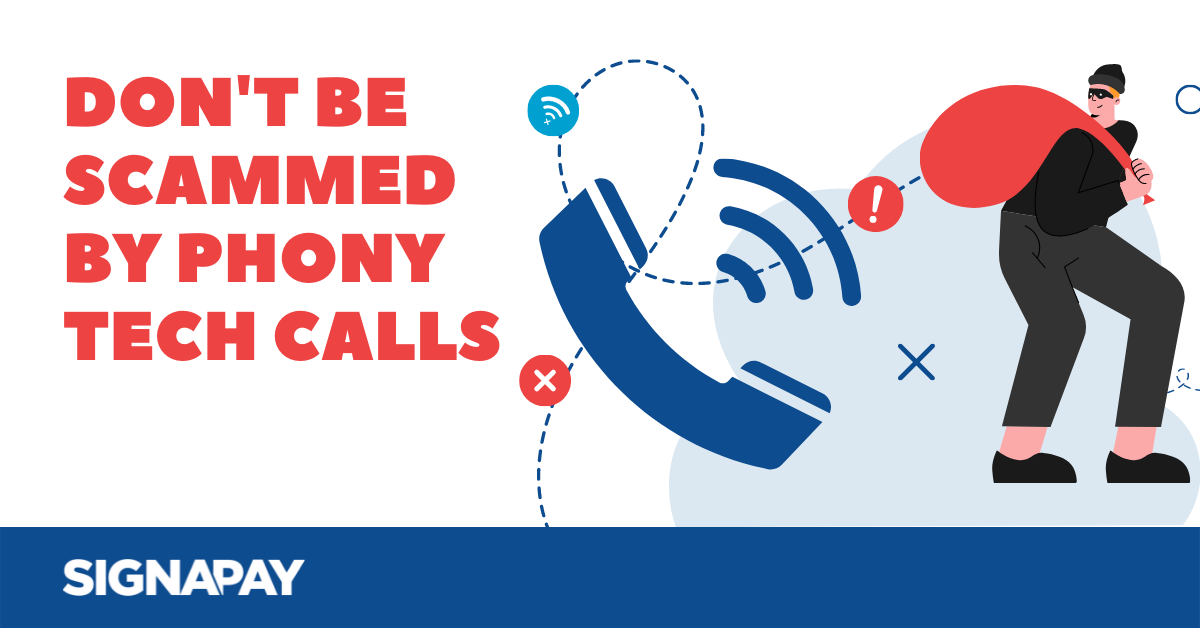Don’t Be Scammed by Phony Tech Support Calls

How scammers are trying to get into your computer over the phone.
When we think of cyber security, we often think about anti-virus software and password management, but did you know another threat lurks around the corner when it comes to computer security? Did you know it was your phone?
Scammers have been peddling phony security software for years, but now they’ve taken to cold calling people to sell their wares. It starts when they get your contact information from a public directory and call you pretending to be well-regarded technology company like Microsoft, Google or Apple. They will try to confuse their victim over the phone with overly technical jargon and sometimes ask to remotely access your computer, ask for passwords, and ultimately, tell you that their software will be the only way to save your computer. They might even try to get you to install software that can be harmful for your computer, like malware, spyware or just even bogus software that does nothing.
These scams are gaining traction, especially with the rise of caller-ID spoofing, the practice of masking a phone number with one that appears legitimate. Here’s what you should do if you get a call you suspect is a scam call:
- Never allow remote access control to a third part who cold calls you.
- If the Caller-ID appears legitimate, don’t let it fool you! Caller-ID spoofing is a reality in our world today and scammers are getting clever.
- Sometimes searching online doesn’t always prove legitimacy. Scammers will setup ads, websites and review pages to make themselves appear legitimate. If you need tech support, start with PC manufacturer who have hotlines for basic support and can direct you to legitimate software companies.
- Scam tech support companies may try to ask you for credit card information. You should never give your credit card information to unknown “tech support” companies that call you without provocation.
- If you are feeling pressured into buying something or purchasing a subscription for software, just hang up the phone.
- Never share your password over the phone. Tech support companies will never ask for your password over the phone.
- If you have not listed your number into the National Do Not Call Registry, do so today. You can also report illegal sales calls to the FTC for violating the National Do Not Call Registry
Recent blog posts
The latest industry news, interviews, technologies, and resources
Strategies for Improving Cost Control and Expense Control
Boosting Your Bottom Line: Strategies for Improving Cost and Expense Control In the fast-paced world of business, keeping a tight grip on costs and expenses is essential for maintaining profitability …
No-Fee Payment Processing: What Businesses Need to Know
No Fee Payment Processing: Understanding Surcharging, Cash Discounts, and Dual Pricing Credit card transactions offer convenient payment options for consumers but often come with fees that can burden businesses. Fortunately, …
Understanding PCI Compliance: Safeguarding Your Business
Discover the essential role of PCI compliance in safeguarding sensitive payment information in today’s digital landscape. Learn about the Payment Card Industry Data Security Standard (PCI DSS) and its stringent requirements for protecting cardholder data across online, in-store, and mobile payment channels. Explore the impact of PCI compliance on data security, operational efficiency, and customer trust. Discover how adherence to PCI standards can mitigate financial risks such as regulatory fines and reputational damage, while enhancing long-term business sustainability. Explore more about PCI compliance and secure your business’s future today.